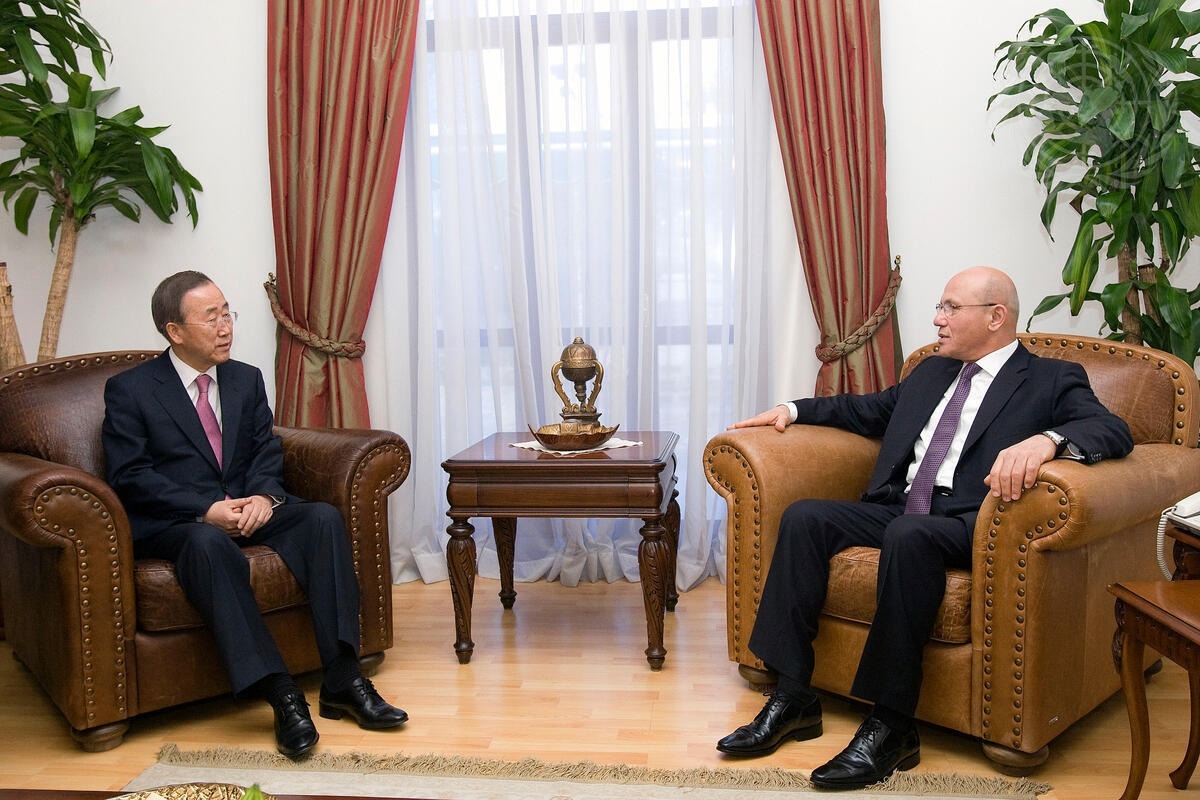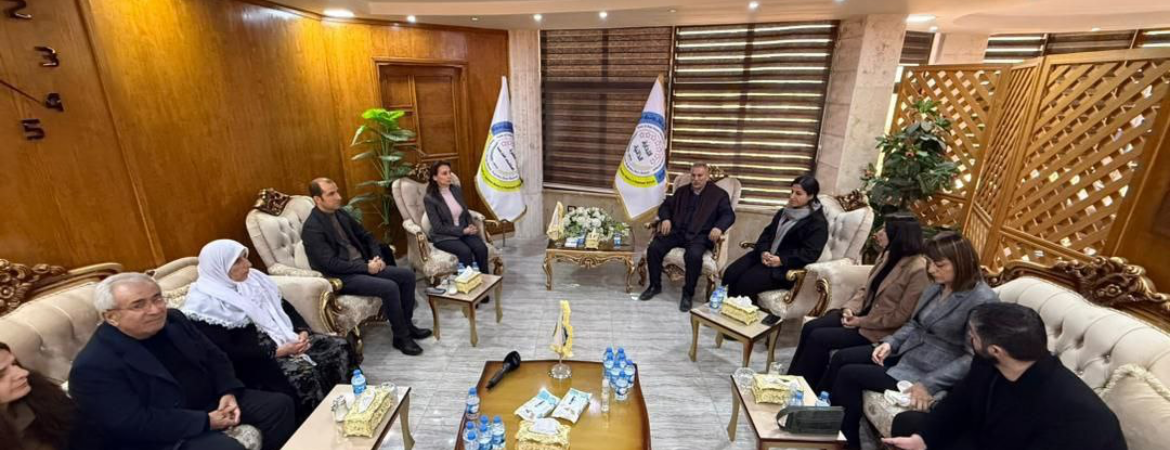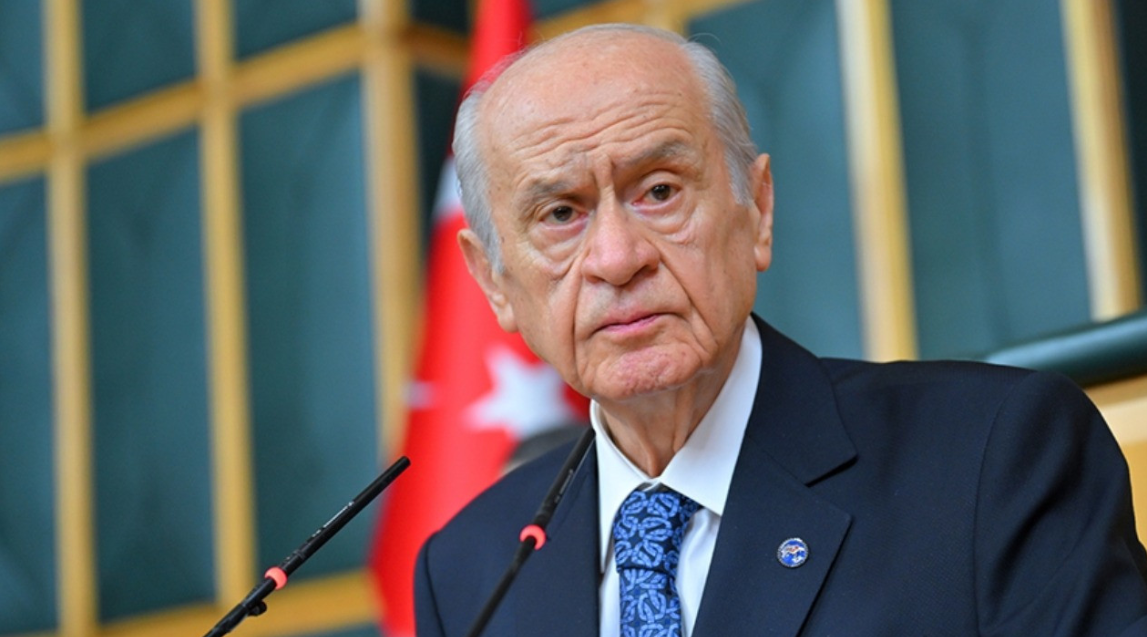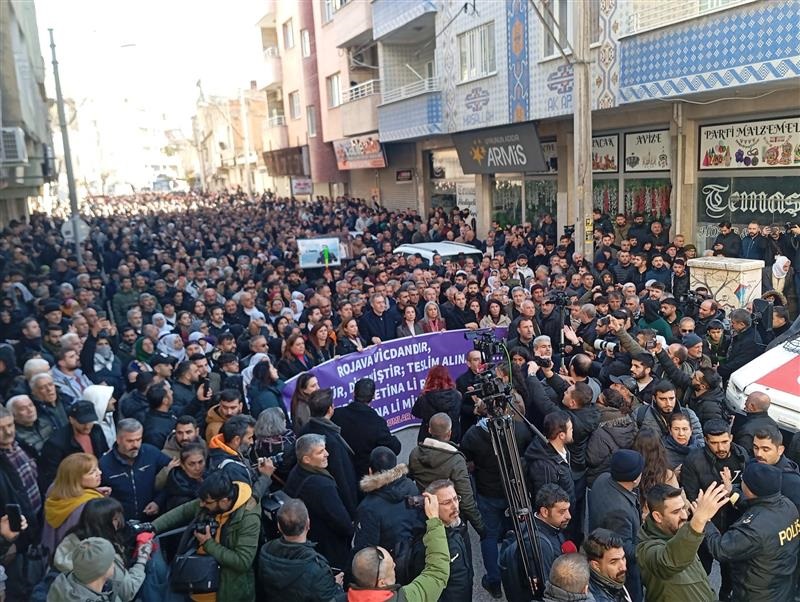Former Turkish Cypriot President Mehmet Ali Talat says Turkish Cypriots “Rejected Turkey’s pressure”

Secretary-General Ban Ki-moon (left) meets with Turkish Cypriot leader Mehmet Ali Talat in Cyprus’ capital, Nicosia.
Photo Credit: Credit
UN Photo/Eskinder Debebe
Secretary-General Ban Ki-moon (left) meets with Turkish Cypriot leader Mehmet Ali Talat in Cyprus’ capital, Nicosia | Photo Credit: UN Photo/Eskinder Debebe
The presidential elections held in Northern Cyprus, the de facto state of the Turkish Republic of Northern Cyprus (TRNC), recognized only by Turkey, on 19 October 2025, marked more than a change in leadership. They were also a turning point in which the island’s people redefined their stance against Turkey’s political pressures.
The Republican Turkish Party (CTP) candidate Tufan Erhürman won 62.7 % of the vote, leaving Turkey-backed Ersin Tatar, who had been in office for five years, far behind. Tatar, who came to power in the 2020 elections with Turkey’s intense intervention, had stood out with his full alignment with Ankara and his rhetoric of a “two-state solution.”
Speaking to The Amargi, former President of the TRNC Mehmet Ali Talat assessed the significance of the October 19 election results, the background of the process leading up to it, and Turkey’s stance on the issue. Talat, who served as president from 2005 to 2010, left his mark with his pro-solution policies during the Annan Plan process and his steps to increase the visibility of Turkish Cypriots in the European Union and the United Nations.
The Amargi: If someone who knows nothing about Northern Cyprus asked you what happened in the Turkish Republic of Northern Cyprus on October 19, what would your answer be?
“Other voters opted for Tatar under pressure. That process disturbed us, the Cypriots, especially those who knew Tatar well.”
Talat: In 2020, we experienced a very traumatic, interventionist election. In particular, the Turkish state forced the election of a politician who was incapable of doing the job of president of the Turkish Republic of Northern Cyprus. Most Cypriots knew very well that Ersin Tatar was incapable of doing the job. Ultimately, in the 2020 elections, some voters who wanted excellent relations with Turkey elected Tatar. Other voters opted for Tatar under pressure. That process disturbed us, the Cypriots, especially those who knew Tatar well. They proved to be right over the five-year period. Tatar’s actions set Cyprus back internationally. This time, Turkey did not intervene as much as it did in 2020, but still supported Tatar. As a result, Cypriots did not re-elect him. Even those of Turkish origin refrained from voting for him.
The Amargi: So, can the results of the October 19 elections be interpreted as the Turkish Cypriot people’s response to Turkey?
Talat: Of course, this is also a reaction to Turkey.
The Amargi: Why did Turkey insist on Ersin Tatar for the second time? What ideological line did the ruling power in Turkey want to establish in Cyprus through Tatar?
Talat: I asked this question to officials who came from Turkey to visit me during the 2020 election process. As you know, in those elections, Ersin Tatar ran against Mustafa Akıncı, who had been president since 2015. I asked the Turkish officials why they supported Tatar instead of Akıncı. They replied, “Because we don’t want Akıncı.” When I said, “Well then, there’s Tufan Erhürman,” they said, “We don’t know if he will act in concert with us.” In the end, Turkey exerted a lot of pressure here in 2020 and got Tatar elected as president. But the citizens saw from the outset that this wouldn’t work. To return to your question, Tatar was someone who would do whatever Turkey wanted, and that’s what happened.
The Amargi: Can you give an example?
“Turkish Cypriots are a society that has embraced secularism much more than the non-secular Greek side.”
Talat: Even Tatar’s wife was against female students wearing headscarves in middle and high schools. However, Tatar, who did whatever Turkey wanted, issued a dress code regulation in schools, thereby allowing students to wear headscarves. [The TRNC Constitutional Court annulled this regulation in its September 2025 decision]. The public reacted very strongly to this regulation because Turkish Cypriots are a society that has embraced secularism much more than the non-secular Greek side.
The Amargi: So, were Tatar’s actions, guided by Turkey, limited to steps such as the headscarf regulation?
Talat: No, no! Tatar was a president who repeated whatever Turkey said on every issue. However, the headscarf regulation was, in a way, the last straw. Turkish Cypriots did not object to the wearing of headscarves at universities or even private high schools, but reacted when it was imposed… In fact, when Recep Tayyip Erdoğan came to Cyprus in May 2025, he said, “If you mess with our girls’ headscarves in Northern Cyprus, you will find us standing against you.”
The Amargi: We know that the Turkish government supported Tatar again in the 2025 elections, even sending large delegations to the island. Ironically, if Turkey had not provided this support, would Tatar have received better results?
Talat: Yes, he could have. Moreover, if Tatar had not acted as a president who does whatever Turkey tells him to do, he would have received even more votes.
The Amargi: What lies behind the Cypriots’ reaction to the Turkish government?
Talat: Turkish Cypriots feel humiliated. The intervention of Turkish government officials in the election campaign here is upsetting the people. Moreover, those who came from Turkey to support Tatar in these elections are not very popular figures. For example, Hulusi Akar, Turkey’s former chief of staff and recent Minister of National Defense, has no connection to Cyprus. Why is he coming here to campaign for Tatar? Or Turkey’s former Minister of Interior, Süleyman Soylu, on what grounds, with what right, is he coming here to campaign?
The Amargi: Tufan Erhürman, the Republican Turkish Party (CTP) candidate, was elected with 62.7 % of the vote. During his election campaign, he emphasized the European Union perspective, fair negotiation, and dialogue. Ersin Tatar, on the other hand, highlighted a two-state solution in Cyprus and full alignment with the “motherland,” meaning Turkey. Do you think voters voted for the candidates’ solution model or their management style?
Talat: It’s not easy to know. I think Turkish Cypriots who want a solution know that recognition of the Turkish Republic of Northern Cyprus is impossible. Therefore, they prefer a solution that is feasible. Secondly, the public knew that Tatar would not be able to do the job. Tatar did not perform successfully in representing Turkish Cypriots, either in Turkey or in other countries. He also failed in international relations. Turkish Cypriots saw that a federal model could be a practical solution and that Tatar did not represent their will. Furthermore, voters reacted to Turkey’s interventions in 2020, and they expressed their reaction much more strongly on October 19.
The Amargi: The leader of the Nationalist Movement Party (MHP), which is part of Turkey’s ruling coalition, Devlet Bahçeli, is openly challenging the election results. He said: “Even if the election results have been announced by the election committee, the TRNC parliament must convene immediately, declare that the election results and the return to federation are unacceptable, and decide to join the Republic of Turkey.” How was Bahçeli’s statement received in Cyprus?
Talat: This stance drew a lot of criticism and had very negative repercussions in Cyprus. First of all, we did not ask Mr. Bahçeli about the legitimacy of the election results! Furthermore, no Turkish official can impose a solution on us.
In 2020, Ersin Tatar was elected under intense pressure. If the same pressure is applied, there could be a major backlash, and Turkish Cypriots will react more harshly.
The Amargi: If Turkey increases the pressure, what will be the response and the consequences?
Talat: The reaction will grow. In 2020, Ersin Tatar was elected under intense pressure. If the same pressure is applied, there could be a major backlash, and Turkish Cypriots will react more harshly.
The Amargi: It is said that the younger generations are not interested in Turkish nationalism or the emphasis on the antagonism between Turks and Greeks as the older generations were. They seem more interested in realistic problems and solutions. The concepts of “motherland” or “daughterland” in reference to Turkey and Northern Cyprus are also not as accepted as they used to be. Do you think the 2025 election results can be seen as indicative of a change in mindset among Turkish Cypriots?
Talat: Of course. The younger generations are reacting against policies that don’t take them into account. It’s not just the younger generations; in these elections, people of Turkish origin also turned to Tufan Erhürman for a variety of reasons. Because these people know that if the Cyprus issue is resolved, they, too, will become citizens of the world and join the European Union. But they know that a two-state solution will neither achieve a result nor allow them to join the EU.
The Amargi: During your presidency from 2005 to 2010, you made significant progress on issues such as relations with the EU and easing the isolation of the TRNC. Do you think Erhürman’s term will be a period of openness, similar to yours? Also, do you expect a radical transformation in the EU’s view of the TRNC with these elections?
Talat: The European Union’s approach towards us is constantly hampered by the Greek Cypriots’ obstructionism. This will continue to be the case. But at least the different views among Turkish Cypriots will be seen by the EU because Erhürman will establish contact with the EU. Tatar, on the other hand, was a president who sometimes even banned EU officials from entering Northern Cyprus! Therefore, it was impossible for EU officials to sympathize with Tatar, and they completely excluded him. Consequently, Tatar was unable to meet with any EU officials during his five-year term. He could not even open a border gate with the Greek Cypriot side.
The Amargi: But Tatar said, “I suggested it, but the Greek Cypriot side didn’t accept it.”
Talat: Well, these gates haven’t been opened in consultation with the Greek Cypriot side until now! Until now, almost all the gates have been opened unilaterally. In other words, the Turkish Cypriot side opened the gates, and the Greek Cypriot side had to comply. The Greek Cypriot had been saying, “It’s not us, it’s the Turks who are blocking free movement in Cyprus.” Therefore, when the Turkish side opened the gate, the Greek Cypriot side couldn’t say, “No, I’ll keep it closed.” During the Tatar period, there was a regression not only in terms of the gates or relations with the EU, but also in relations with the whole world, including Islamic countries. Even the Organization of Islamic Cooperation, which met in Istanbul in June 2025, stated in its “Istanbul Declaration” that “the rights of the Muslim Turkish Cypriot community must be guaranteed.”
The Amargi:-What is the problem with that?
Talat: Where did the term “Muslim Turkish community” come from? We are an observer member in the Organization of Islamic Cooperation under the name “Turkish Cypriot state.” “Muslim Turkish community” is the jargon of the British administration, which classified Cypriots as Christian or Muslim. Using this jargon would be a huge step backward.
The Amargi: Especially in recent times, developments in the Middle East, Israel-Turkey relations, disputes over the natural gas pipeline in the Eastern Mediterranean, and regional energy competition have led to Cyprus being assigned critical importance. What are the greatest risks in terms of foreign policy in the new era? How should the TRNC strike a balance in this scenario?
Talat: The TRNC should demonstrate its will to find a solution and pursue a policy stating, “We want a solution, but we anticipate a negotiation process that will be completed within a certain period of time.” I don’t see any other way. Of course, we want to pursue this in cooperation with Turkey, but we will see how feasible this is in the coming days.
The Amargi: During his election campaign, Erhürman promised to establish parallel diplomatic channels with the UN, the EU, and Turkey within the first 100 days of his term if elected. Does this timeline seem realistic to you?
Talat: I don’t know, but Erhürman will try to achieve this. Whether he succeeds or not depends somewhat on the attitude of the other actors. If Turkey stands up and says, “No, we do not accept any approach other than a two-state solution,” then this will be delayed.
The Amargi: Northern Cyprus’s internal problems are as deep as its external ones. Economic problems, unemployment, and allegations that Turkey uses it as its “backyard” are particularly widespread. What kind of transformation has Northern Cyprus undergone in the last five to ten years?
Talat: If Northern Cyprus has been used as a backyard, it means that the relationships here were open to such use. In 1996, during the Tansu Çiller government, Turkey closed its casinos. But at the time, they said, “Let casinos open in Cyprus before gambling moves to countries like Bulgaria and Georgia.” They saw casinos as a contribution to the Cypriot economy. That is indeed what happened. But illegal activities also find fertile ground around casinos and similar establishments. Yet, measures against illegal activities were never taken. Money laundering was seen as a source of income until it reached a point where it bothered both Turkey and the US. During my presidency, we involved the Ministry of Finance and contacted the OECD Financial Action Task Force (FATF). We managed to remove Cyprus from the list of “countries at risk of money laundering.” Turkey also supported us. But ultimately, these types of financial problems or relationships became institutionalized in some way, and structures conducive to money laundering were, in a sense, encouraged by Turkey. Even if Turkey did not encourage it, the current regime in Cyprus supported these structures, and Turkey supported this regime. Perhaps because the correct information was not shared about the crime network that killed Halil Falyalı on 8 February 2022, the murder was not prevented. I am not saying this was done deliberately, but the person who came here and committed the murder was able to leave Cyprus by plane that night. How is this possible? Unfortunately, all this happened in this country. Ultimately, these relationships have tainted the politics, the economy, and human relations here.
The Amargi: Do you think the latest elections will also provide an opportunity to clean up this corruption?
Talat: I don’t know yet, because the president has changed, but the government remains the same. The government’s capacity is also highly questionable due to issues such as corruption, nepotism, incompetence, and partisanship.
The Amargi: It’s a very common problem in Turkey, too.
Talat: Yes, it’s the same problem. That’s why the Turkish government turns a blind eye to these things. “If these things exist in Turkey, why shouldn’t they exist in Cyprus?”
İrfan Aktan
İrfan Aktan was born in Hakkari-Yüksekova. He graduated from the Journalism Department of the Faculty of Communication at Ankara University in 2000 and completed his Master’s Degree in the Women’s Studies Center at Ankara University. He worked as journalist for Bianet, BirGün newspaper, Express, Nokta, Yeni Aktüel, and Newsweek-Türkiye magazines, Gazete Duvar, Artı Gerçek and IMC TV. His books include Nazê/Bir ‘Göçüş’ Öyküsü, Zehir ve Panzehir: Kürt Sorunu and Karihōmen: Japonya’da Kürt Olmak.



